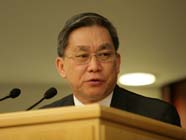
UN DESA’s Statistics Division plays a vital role in collecting and analyzing data from around the world. Leading this work is Professor Paul Cheung, known worldwide for his contributions to the development of official statistics. “Statistics are crucial to economic and social development,” he says in an interview for DESA News.
Professor Cheung, recognized for his pioneering research in the fields of manpower, population and social planning, highlights the importance of statistics and their contributions to global development. “It is clear that without solid information we cannot measure where we are and what needs to be done, with respect to the MDGs or in other domains. If the world cannot get the right numbers, it cannot come out with the right solutions,” he says. Professor Cheung moreover gives praise to official statisticians around the globe, spotlighting the fact that this community “has worked steadfastly in the past six decades in building a global statistical system that the world relies on.”
Thanks to the work of the Statistics Division, important data is being collected helping the world to make informed decisions. What do you see as the main challenges in the work gathering and analyzing data from around the world?
“Indeed, an informed policy debate should be supported and facilitated by timely, consistent and relevant data at all levels. For the international users of data, an important quality dimension has to be added: data have to be comparable across countries. This is achieved by the United Nations Statistical Commission who has the unique mandate to set international statistical standards and methodologies in the various statistical fields. Based on the international standards, countries from all over the world can then produce and submit reliable and comparable data to the United Nations Statistics Division. Just imagine if there was no common standard in the compilation of ‘national income’ or ‘Gross Domestic Product (GDP)’. We would have all kinds of economic data with no common assessment platform.
Since 1946, the United Nations Statistics Division has collected billions of data records from all around the globe. In this context, I want to pay tribute to the professional community of official statisticians around the globe. This community has worked steadfastly in the past six decades in building a global statistical system that the world relies on. “Service, Professionalism and Integrity” were the key themes of our first World Statistics Day celebrated on 20 October 2010 (twenty-ten-twenty-ten) in which over 140 countries participated with high-level events, involving some heads of states and government. We are proud to be part of this global statistical community and the very existence of this global professional statistical family, which transcends political, economic and cultural differences among countries and works hand-in-hand to build common standards and databases, is perhaps our biggest achievement of all.”
What do you think is the most important contribution of statistics in promoting global development?
“In his address on the occasion of the first World Statistics Day, the Secretary-General observed that ‘Statistics permeate modern life. They are the basis for many governmental, business and community decisions.’
Statistics are crucial to economic and social development. They serve as reference points in public debates and contribute to the progress of our nations. They are indispensable to academic research and the development of businesses and the civil society. Statistics ultimately serve everyone in society.
A good example of the contribution of statistics in global development relates to the Millennium Development Goals. When the MDGs were established after the adoption of the Millennium Declaration, specific goals and targets were established and statistical monitoring was urgently required to assess the pace with which the world is progressing towards the MDGS. The member states and international agencies have worked very hard and very closely together to develop and harmonize their statistical tools in order to provide the data for the monitoring. We are happy to report that, as a result of this joint effort, we are able to produce a yearly assessment of the MDG progress. We are now working towards the final assessment of the MDGs when it reaches the target year of 2015.
It is clear that without solid information we cannot measure where we are and what needs to be done, with respect to the MDGs or in other domains. If the world cannot get the right numbers, it cannot come out with the right solutions. This is why we are committed to participate actively in the discussion on the post-2015 development agenda, in order to advise policy decision makers on which targets are actually measurable and for which indicators data can reliably be produced.”
What do you hope the 43rd Session of the Statistical Commission will accomplish this year?
“The 43rd session of the Statistical Commission will be held from 28 February to 2 March 2012. We are again looking forward to strong participation from member states. As in past years, we expect about 140 countries to be represented by their experts from the capital, making the Statistical Commission a truly global forum on official statistics. It has been said before that ‘Official Statistics’ is an area where the United Nations truly works well. The normative work of the Commission over the past 65 years is an important example of how the United Nations Member States can effectively act in unison, especially at times where the ability of the international community to act together in other areas is sometimes limited.
As mentioned before the core business of the United Nations Statistical Commission is to adopt international methodological standards and guidelines in virtually every area of statistics. This year the Commission has again a busy programme with over 30 technical reports to look at. In particular, the Commission will look at the proposals for a new Framework on the Development of Environmental Statistics and for the System of Environmental and Economic Accounting, which are highly relevant in the context of the Rio+20 Summit. This Commission session will also review the lessons learnt from the 2010 census round, where as of 1 January 2012, 180 countries and areas have conducted a census, enumerating 87 per cent of the world population. Censuses have helped countries collect enormous amounts of demographic and social data. Moreover, the Commission will address the issue of how coordination in statistics within the UN System can be improved further. Finally, given its overwhelming success, it is also expected that the Commission will approve a five-year cycle for the celebration of World Statistics Day.”
There will be a high-level forum on “Measuring the Unmeasurable: Challenging the Limits of Official Statistics” on 27 February. Can you highlight some examples of the “unmeasurable” and how your division tries to tackle these challenges?
“In order to remain relevant in a rapidly changing world, the statistical community has to continuously examine and push its own boundaries. Phenomena, which are not easily measurable today, may become important tomorrow, so we have to be prepared. In the past years it has become customary to explore ‘cutting edge’ issues in the format of a ‘high level forum’, which allows brainstorming and free-flowing exchange. In these discussions, we have to balance the desire to explore new ideas which may require new measurement tools and the need to preserve the credibility and reputation of official statistics.
This year’s event will focus on issues such as the measurement of happiness, well-being and ecosystem services and other difficult concepts. These are complicated topics with no clear measurement yardsticks. How to take the complex interaction between the environment and the economy into account and how to capture the level of well being in a country, which may include a high degree of subjectivity, will be discussed among the chief statisticians of the world.”
Last year, the Statistics Division arranged many seminars and workshops around the world focusing on a variety of issues including statistics on the MDGs, energy, environment and on population and housing censuses. Can you describe this type of work?
“Capacity building is a fundamental pillar of the work of our Division. In 2011 alone, more than 2600 official statisticians around the world participated in one of our events (conferences, expert groups, workshops and fellowship programmes). Specifically, over 35 training workshops and seminars were organized in the developing countries to assist the countries to gain the requisite knowledge. In this effort we always work closely with member states and with our partners in the international statistical agencies. To give an example of such cooperation, we launched in 2011 the China International Statistical Training Center which operates in collaboration with ‘UN Statistics’. Through this center, we have organized 8 international training activities. More are being planned.
Through our training activities, we are able to understand the needs of national statistical systems and how they are performing. This will allow us to direct more resources to those countries in need. In 2011, the global statistical community has adopted a Busan Plan of Action on Statistical development at the High Level Forum on Aid Effectiveness. In this document, we highlighted the areas that would require greater injection of resources as we bring the global statistical system forward. We will be working with the development partners in implementing this Plan of Action. The UN Statistical Commission will discuss this Plan of Action in its forthcoming session.”
A new UN Committee of Experts on Global Geospatial Information Management (GGIM) was created and inaugurated last year. Are there any special events or projects that the Committee will focus on during the coming year?
“The resolution of the UN Economic and Social Council to create a UN Committee of Experts on Global Geospatial Information Management came at a time when few new bodies are being created. This bold decision reflects the Council’s conviction that promoting greater and wider use of geospatial information globally is essential, especially in a context where we are discussing how to manage the resources on this planet responsibly.
The Committee, which will hold its second formal meeting in August 2012 in New York, is in the process for formulating its priorities and deciding on its work plan for the coming years. The setting of global standards on geospatial information, the evolution of an ethical statement on the production and use of geospatial information, and the pooling of information and platforms are clearly the main issues to be tackled. As new technologies have deeply transformed the availability and accessibility of geospatial information and its potential uses, we are working very closely on these issues with our partners in the international organizations and in the private sector. A second high-level forum on GGIM, to be hosted by the Government of Qatar in Doha, is now planned for 4-6 February 2013. This Forum will bring together all the stakeholders in an inclusive fashion to discuss the priority issues facing the geospatial information community before they are being formally addressed by the inter-governmental Committee.”
For more information: http://unstats.un.org/unsd/default.htm
Bio of Professor Paul Cheung: http://unstats.un.org/unsd/newsletter/unsd_director.htm

